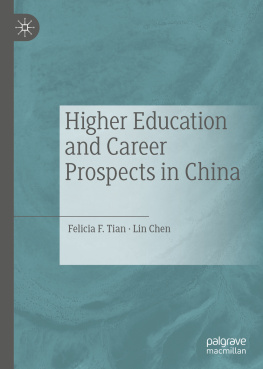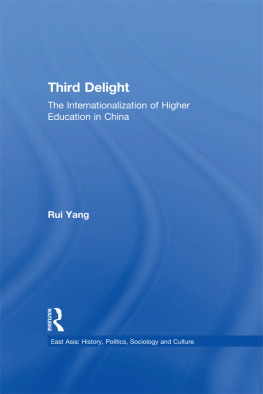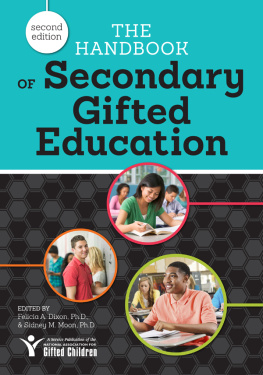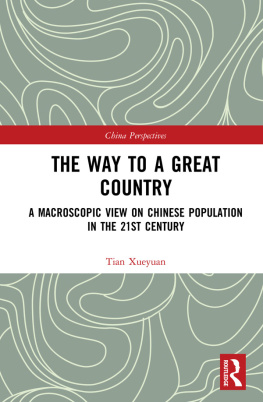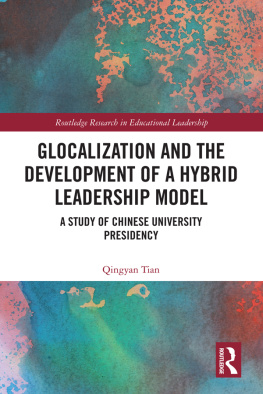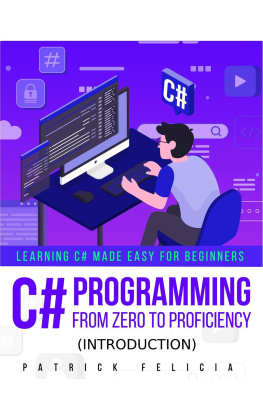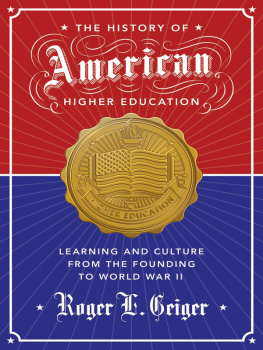Felicia F. Tian - Higher Education and Career Prospects in China
Here you can read online Felicia F. Tian - Higher Education and Career Prospects in China full text of the book (entire story) in english for free. Download pdf and epub, get meaning, cover and reviews about this ebook. year: 2020, publisher: Springer Singapore, genre: Politics. Description of the work, (preface) as well as reviews are available. Best literature library LitArk.com created for fans of good reading and offers a wide selection of genres:
Romance novel
Science fiction
Adventure
Detective
Science
History
Home and family
Prose
Art
Politics
Computer
Non-fiction
Religion
Business
Children
Humor
Choose a favorite category and find really read worthwhile books. Enjoy immersion in the world of imagination, feel the emotions of the characters or learn something new for yourself, make an fascinating discovery.
- Book:Higher Education and Career Prospects in China
- Author:
- Publisher:Springer Singapore
- Genre:
- Year:2020
- Rating:4 / 5
- Favourites:Add to favourites
- Your mark:
- 80
- 1
- 2
- 3
- 4
- 5
Higher Education and Career Prospects in China: summary, description and annotation
We offer to read an annotation, description, summary or preface (depends on what the author of the book "Higher Education and Career Prospects in China" wrote himself). If you haven't found the necessary information about the book — write in the comments, we will try to find it.
Higher Education and Career Prospects in China — read online for free the complete book (whole text) full work
Below is the text of the book, divided by pages. System saving the place of the last page read, allows you to conveniently read the book "Higher Education and Career Prospects in China" online for free, without having to search again every time where you left off. Put a bookmark, and you can go to the page where you finished reading at any time.
Font size:
Interval:
Bookmark:
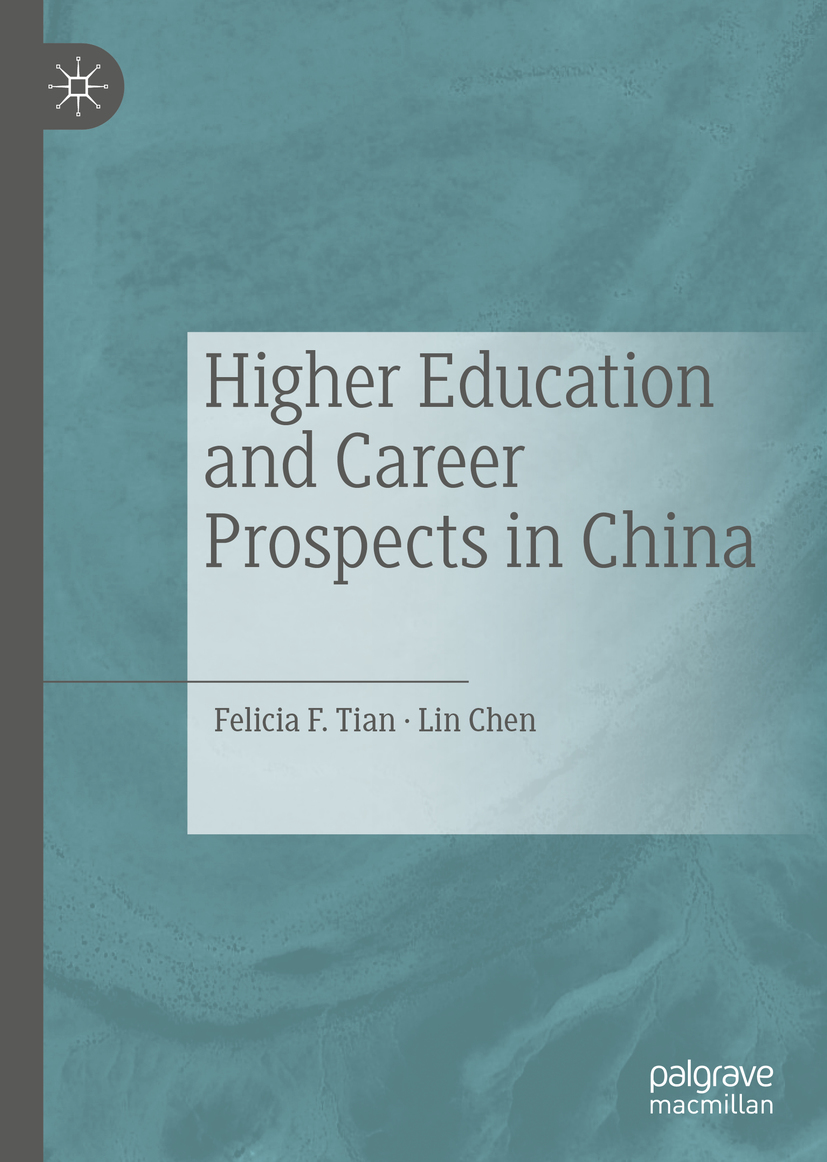

This Palgrave Macmillan imprint is published by the registered company Springer Nature Singapore Pte Ltd.
The registered company address is: 152 Beach Road, #21-01/04 Gateway East, Singapore 189721, Singapore
To Huiqing Lin, Sijun Xu, and Qifan Wang
For 40 years, I have taught ambitious, talented undergraduates at Yale College. Over these four decades, the Yale student body has become more diverse. Today, the percentage of students from elite private schools has declined and the percentage of those who are the first in their family to attend university has increased. Yet, the majority in each class still come from some of the countrys most academically strong and cosmopolitan schools and has parents who have spent heavily on extracurricular activities. To minimize the impact of such familial advantages on a students ability to thrive at Yale, the university goes beyond offering generous financial aid to develop programs and identify mentors for those whose high school was not nationally ranked or whose parents did not go beyond high school. Nevertheless, even as the leadership acknowledges that the cumulative advantages of family background create initial inequalities, they also firmly believe that all ambitious, bright students can flourish and that an elite Ivy School education will be an equalizer.
Given the enormous differences in the resources and history of higher education in China and the US, readers may initially expect that the struggles and achievements of economically disadvantaged students in China would fundamentally differ from what I have observed at Yale. Chinese students enter an elite university on the basis of scores on a uniform examination of specific subjects, not through the evaluation of a dossier that may privilege extracurricular and athletic achievements above scores on a standardized test. Moreover, the Scholastic Assessment Test (SAT) exams in the United State, unlike the Chinese university entrance exams, do not test mastery of specific course material; rather, they try to capture the far more amorphous and culturally shaped metric of intellectual capacity. In China, tuition is generally low enough that it does not dictate a students choice of school as in the US. The Chinese Ministry of Education, not the leadership of an individual college, supervises, sometimes even proscribes the curriculum. Finally, in China, a national system of household registration categorizes every citizen as either an urban or a rural resident, and in most provinces, that distinction channels high school students into separate and unequal school systems. Yet, when Felicia Tian and Lin Chen systematically probe the impact of cumulative advantage among a group of rural and urban born students who entered one of Chinas most elite universities in the fall of 2014, their conclusions about the hard-earned maturity and self-awareness among these students will challenge prevailing assumption about the exceptionalism of both US and Chinese universities.
Drawing on my experience of teaching undergraduates at another elite university in China, I would also stress that the experience of these students in Shanghai is not unique to this university or to this particular birth cohort. I first went to China as a sociological researcher in 1979, and for the next 40 years, questions about how the accident of birth shaped career have informed my research. In several projects, I specifically focused on estimating whether educational credentials independent of all else allowed an individual to surpass the social status of their parents or earn more than others from their generation. Most relevant for evaluating the generalizability of the case studies inHigher Education and Career Prospects in China, however, was my experience of teaching undergraduates at Peking University in 2008.
I first went to China in 1979, as one of the first American sociologists allowed to do fieldwork in the Peoples Republic of China (PRC). Between 1981 and 2006, I completed multiple training workshops and field projects, using focus groups, oral histories, and large-scale representative surveys. I also was lucky enough to work with several members of the first generation trained as sociologists after 1978, some of whom. such as Wang Feng and Yanjie Bian, later became my co-investigators and co-authors. But it was only in 2008, when I spent a semester teaching at Peking University (PKU), that I fully immersed myself in teaching undergraduates. As expected, the PKU students closely resembled undergraduates at Yale in terms of their creativity, superb study skills, and high ambitions for their future careers. But, more unexpectedly, they also closely resembled their Yale peers in terms of their confusion and anxiety about how best to use their undergraduate years to identify and prepare for the successful careers that they, their parents, and their high school teachers all expected. And for those who came from the countryside or small county towns, and whose parents had not graduated from college, the anxiety was often palpable even to a visiting professor.
Thus, I found Tian and Chens account of what they term the emerging adult experience among the rural born undergraduates resonated with what I had observed with my students at PKU. Among my students were also a small number of rural-born high achievers, who told me they were embarrassed by their poor English and whose worn sneakers and torn backpacks set them apart. Among the first- and second-year students in my lecture course, they often seemed to sit alone in the cafeteria and did not move in tandem with others. Yet, from their essays and from conversations in office hours, I heard the same kind of exploration and reflection that Tian and Chen found as they listened to the struggles of their rural-born students. Then from the more extended interaction with the seniors who took my research methods course, I witnessed the same hard-earned self-confidence about a professional future that would not be identical to that of urban, particularly Beijing, born classmates, but would fulfill their personal ambition. Like Tian and Chen, I also was impressed by how these resilient, high-achieving, rural-born students achieved a new relationship with their parents. Like many of the rural-born students profiled in this book, my rural-born undergraduates stressed that because their parents had never been to college, and usually had never left their home province, by their final year at PKU, they not only had fulfilled their parents dreams to send a child to university but they also occupied the role of an adult in their household. Their entry into PKU represented the same bright promise of the entire family that Tian and Chen flag, and by graduation, they had earned the right to disagree with their parents. Short conversations with a visiting faculty provide less substantial evidence than the extended interviews that Tian and Chen collected systematically over four years. But the parallels to my experience at PKU convinced me that the emphasis that Tian and Chen give to exploration and reflection is neither exceptional nor unique.
Font size:
Interval:
Bookmark:
Similar books «Higher Education and Career Prospects in China»
Look at similar books to Higher Education and Career Prospects in China. We have selected literature similar in name and meaning in the hope of providing readers with more options to find new, interesting, not yet read works.
Discussion, reviews of the book Higher Education and Career Prospects in China and just readers' own opinions. Leave your comments, write what you think about the work, its meaning or the main characters. Specify what exactly you liked and what you didn't like, and why you think so.

